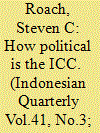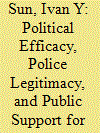| Srl | Item |
| 1 |
ID:
125347


|
|
|
|
|
| Publication |
2013.
|
| Summary/Abstract |
The International Criminal Court faces many daunting political challenges in Kenya, Libya and Sudan. It has addressed these challenges and defended its impartiality in these situations by insisting that it remains an apolitical institution. This article challenges the conventional focus on the ICC`s apolitical nature by adopting an alternative approach that examines its political and pragmatic role in seeking mutual accommodation. It argues that the ICC can and should seek mutual accommodation rather than simply justice under the Rome Statute. In doing so, the article develops and applies the term diplomatic efficacy, or the political capacity of the ICC to produce acceptable solutions, by addressing the soft power dimension of such efficacy. The ICCS`s diplomatic efficacy not only reflects its special role as an independent court or agent in the interstate system, but also represents a practical and strategic to manage the political problems that its interventions and deferral to national authorities may create. The article concludes that the ICC`s political efficacy can help to resolve the incongruities between proactive complementarity and the provisions of cooperation encoded in the Rome Statute
|
|
|
|
|
|
|
|
|
|
|
|
|
|
|
|
| 2 |
ID:
188094


|
|
|
|
|
| Summary/Abstract |
The threat of terrorism has surfaced as a top priority in national and global security over the past two decades. Drawing upon survey data collected by the Chinese General Social Survey, this study assesses the relationships among political efficacy, police legitimacy, and public support for counterterrorism measures in China. The majority of surveyed Chinese people do not favor aggressive law enforcement actions even when a terrorist attack is imminent. Public support for different forms of antiterrorism means is inversely related to the level of coercion associated with each measure, with wiretapping receiving the highest support, followed by stop and search, and detention. Path analysis results showed that self-rated political knowledge lowers people’s positive evaluations of police legitimacy, whereas political influence strengthens such perception. Stronger senses of police legitimacy then lead to lower support for counterterrorism measures. Additionally, females and racial/ethnic minorities are less likely to favor aggressive antiterrorism activities, while older and college-educated people are more inclined to endorse counterterrorism measures. Implications for future research are discussed.
|
|
|
|
|
|
|
|
|
|
|
|
|
|
|
|
| 3 |
ID:
181558


|
|
|
|
|
| Summary/Abstract |
Theoretical work argues that citizens gain important symbolic benefits when they are represented by gender-inclusive institutions. Despite the centrality of this claim in the literature, empirical evidence is mixed. In this article, I argue that these mixed findings are—in part—because many Americans hold beliefs about women’s inclusion that are out of step with reality. Leveraging variation in survey respondents’ beliefs about women’s representation, I examine how these perceptions influence attitudes toward Congress and state legislatures. In both cases, I find that believing women are included is associated with higher levels of external efficacy among both men and women. Using panel data, I then show that when citizens’ underestimations (overestimations) are corrected, their levels of efficacy increase (decrease), shedding further light on this relationship. The findings presented in this research add new theoretical insights into when, and how, Americans consider descriptive representation when evaluating the institutions that represent them.
|
|
|
|
|
|
|
|
|
|
|
|
|
|
|
|